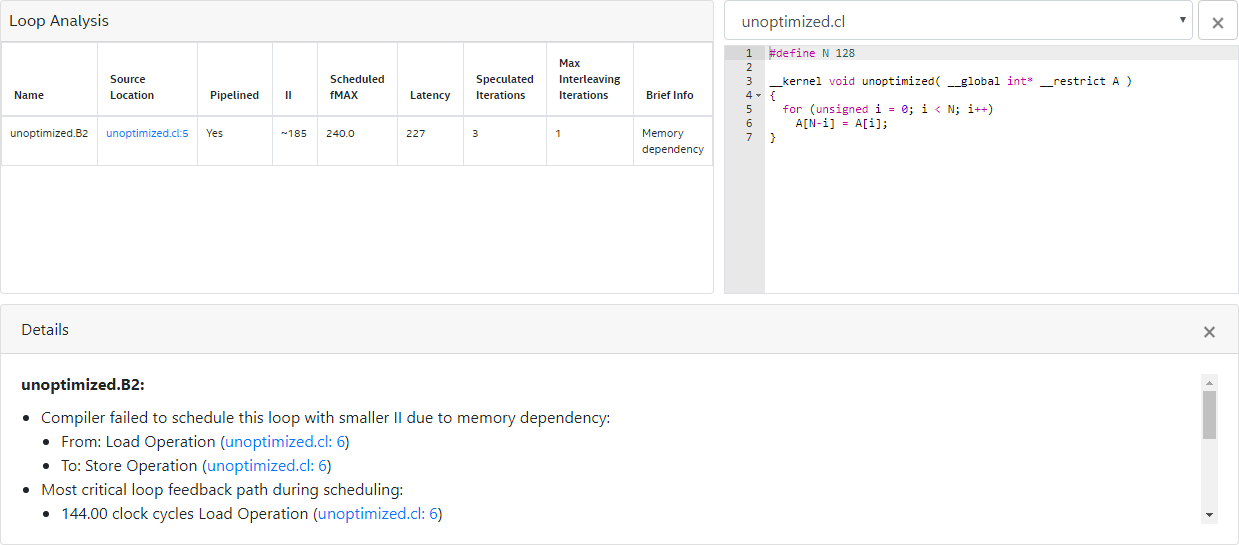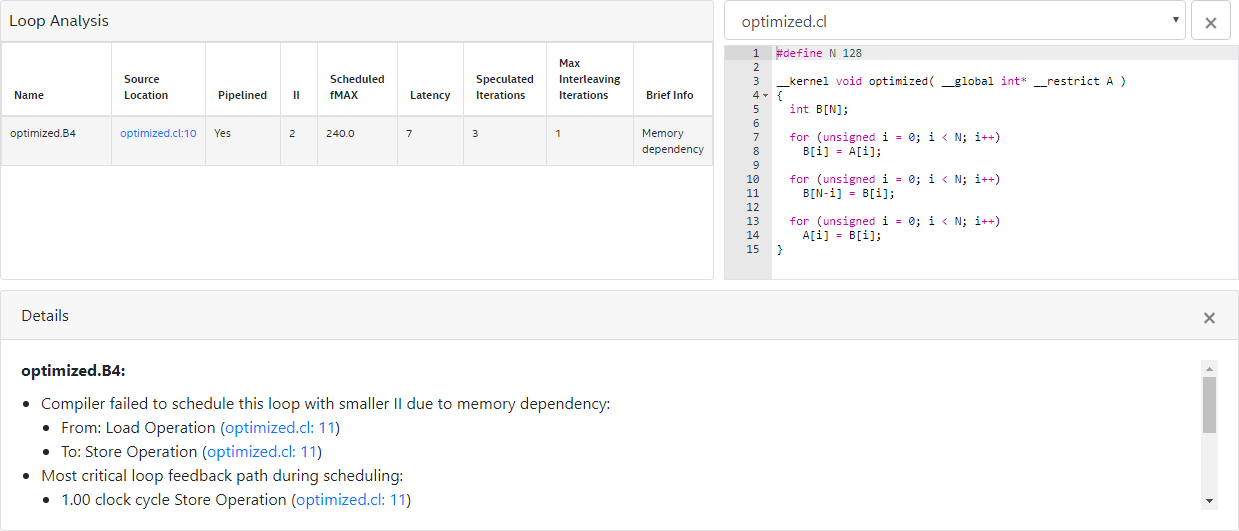Intel® FPGA SDK for OpenCL™ Pro Edition: Best Practices Guide
ID
683521
Date
3/28/2022
Public
A newer version of this document is available. Customers should click here to go to the newest version.
1. Introduction to Intel® FPGA SDK for OpenCL™ Pro Edition Best Practices Guide
2. Reviewing Your Kernel's report.html File
3. OpenCL Kernel Design Concepts
4. OpenCL Kernel Design Best Practices
5. Profiling Your Kernel to Identify Performance Bottlenecks
6. Strategies for Improving Single Work-Item Kernel Performance
7. Strategies for Improving NDRange Kernel Data Processing Efficiency
8. Strategies for Improving Memory Access Efficiency
9. Strategies for Optimizing FPGA Area Usage
10. Strategies for Optimizing Intel® Stratix® 10 OpenCL Designs
11. Strategies for Improving Performance in Your Host Application
12. Intel® FPGA SDK for OpenCL™ Pro Edition Best Practices Guide Archives
A. Document Revision History for the Intel® FPGA SDK for OpenCL™ Pro Edition Best Practices Guide
2.1. High-Level Design Report Layout
2.2. Reviewing the Summary Report
2.3. Viewing Throughput Bottlenecks in the Design
2.4. Using Views
2.5. Analyzing Throughput
2.6. Reviewing Area Information
2.7. Optimizing an OpenCL Design Example Based on Information in the HTML Report
2.8. Accessing HLD FPGA Reports in JSON Format
4.1. Transferring Data Via Intel® FPGA SDK for OpenCL™ Channels or OpenCL Pipes
4.2. Unrolling Loops
4.3. Optimizing Floating-Point Operations
4.4. Allocating Aligned Memory
4.5. Aligning a Struct with or without Padding
4.6. Maintaining Similar Structures for Vector Type Elements
4.7. Avoiding Pointer Aliasing
4.8. Avoid Expensive Functions
4.9. Avoiding Work-Item ID-Dependent Backward Branching
5.1. Best Practices for Profiling Your Kernel
5.2. Instrumenting the Kernel Pipeline with Performance Counters (-profile)
5.3. Obtaining Profiling Data During Runtime
5.4. Reducing Area Resource Use While Profiling
5.5. Temporal Performance Collection
5.6. Performance Data Types
5.7. Interpreting the Profiling Information
5.8. Profiler Analyses of Example OpenCL Design Scenarios
5.9. Intel® FPGA Dynamic Profiler for OpenCL™ Limitations
8.1. General Guidelines on Optimizing Memory Accesses
8.2. Optimize Global Memory Accesses
8.3. Performing Kernel Computations Using Constant, Local or Private Memory
8.4. Improving Kernel Performance by Banking the Local Memory
8.5. Optimizing Accesses to Local Memory by Controlling the Memory Replication Factor
8.6. Minimizing the Memory Dependencies for Loop Pipelining
8.7. Static Memory Coalescing
6.1.3. Transferring Loop-Carried Dependency to Local Memory
For a loop-carried dependency that you cannot remove, improve the II by moving the array with the loop-carried dependency from global memory to local memory.
Consider the following kernel example:
1 #define N 128
2
3 __kernel void unoptimized( __global int* restrict A )
4 {
5 for (unsigned i = 0; i < N; i++)
6 A[N-i] = A[i];
7 } 
Global memory accesses have long latencies. In this example, the loop-carried dependency on the array A[i] causes the long latency. This latency is reflected by an II of 227 in the optimization report. To reduce the II value by transferring the loop-carried dependency from global memory to local memory, perform the following tasks:
- Copy the array with the loop-carried dependency to local memory. In this example, array A[i] becomes array B[i] in local memory.
- Execute the loop with the loop-carried dependence on array B[i].
- Copy the array back to global memory.
When you transfer array A[i] to local memory and it becomes array B[i], the loop-carried dependency is now on B[i]. Because local memory has a much lower latency than global memory, the II value improves.
Below is the restructured kernel optimized:
1 #define N 128
2
3 __kernel void optimized( __global int* restrict A )
4 {
5 int B[N];
6
7 for (unsigned i = 0; i < N; i++)
8 B[i] = A[i];
9
10 for (unsigned i = 0; i < N; i++)
11 B[N-i] = B[i];
12
13 for (unsigned i = 0; i < N; i++)
14 A[i] = B[i];
15 }An optimization report similar to the one below indicates the successful reduction of II from 227 to 2: 